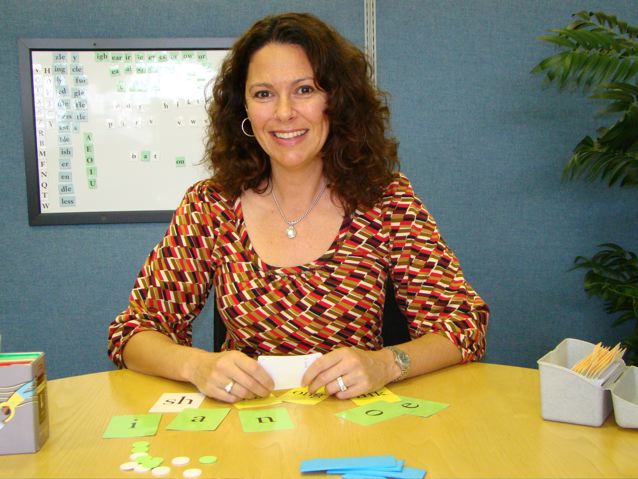
by PRIDE Reading Program Admin | Nov 16, 2015 | A PRIDE Post, Spelling
I know many adults who truly believe that they cannot spell, saying “I can’t spell” in the same manner that they would say, “I can’t swim.” But spelling, like swimming, can be taught. However, while most teachers know how to test for spelling, very few know how to teach spelling.
There is a misconception that spelling is a form of dyslexia, a disorder where one is unable to recognize words or sound them out phonetically. The acts of reading and writing occur mainly in the left temporal lobe of your brain – the part of the brain near your left ear. The act of spelling, however, occurs mainly in the occipital lobe of your brain – the visual cortex in the back of your head responsible for forming and retrieving visual memories. So, to remember how to spell a word, you must first store the memory of that word, and then retrieve that “picture” when you are about to write it.
The Three Types of Memory
When I teach spelling to children and to adults, I first talk about the three types of memory. The first type of memory can be called “Blackboard” memory, which lasts from 1-30 seconds. The goal of your brain in Blackboard memory, surprisingly, is to forget what you’ve seen. For example, if you’re driving down the street and see various business signs, “Tom’s Bakery,” “Joe’s Key Shop”, “Chan’s Dry Cleaners,” etc., you certainly don’t want to keep remembering Joe’s Key Shop for the rest of the day. Rather, a “slide” of Joe’s Key Shop is stored in your visual memory, but you’ve made no pathway to consciously retrieve the memory. Occasionally there may be an accompanying smell (such as the bakery next to the key shop) which may remind you of the key shop, but you’ll most likely not remember that the key shop exists. So, when you actually need a key made, you’ll probably have to search the listings for one, and lo and behold, there’s Joe and his key shop right around the corner!
The second type of memory can be called Short-Term Memory, which lasts from 31 seconds to about 2-3 months. Most children rely on Short-Term Memory to recall information for tests, midterms, and final exams, but then forget the information the following year (which explains why kids have to be re-taught “mean, median, and mode” every year from elementary to high school). The third type of memory, Long-Term Memory, is the stored memories of experiences and information that we will always be able to recall, either from connection to an emotional event (e.g., World Trade Center) or from multiple uses (e.g., names, phone numbers, addresses, etc.).
The goal of all learning, then, is to place what needs to be remembered into the student’s Short-Term Memory, so that facts, dates, and the spelling of words can be recalled. Once this information is stored in Short-Term Memory, a pathway is established so that the student is able to consciously retrieve the information for up to 3 months. If there is repeated exposure to the information, this pathway becomes even more established, forming a Long-Term Memory.
Simple Technique for Perfect Spelling
Teaching spelling in school is usually done by having a student copy the words over and over again, which of course does not work at all. By copying the words, their spelling never leaves the student’s Blackboard Memory, so the brain does its job well and dutifully helps the student forget the spelling. The goal, then, is to place the spelling of the word in the student’s Short-Term Memory, so it’s “picture” can be retrieved.
Here is a simple technique that you can do at home to help your child succeed in spelling:
1. Have your child write the spelling word on a piece of paper, then trace the letters with his or her index finger while saying the spelling word out loud. Have the child say the word normally while tracing it, not say or sound out individual letters or vowels.
2. Take the paper away and wait a minimum of 30 seconds (e.g., sing the “Jeopardy!” theme or some other song).
3. Give your child a blank paper, saying, “Now, write the word you traced.”
4. If your child spells the word incorrectly – which is likely to occur at the beginning of this technique – go back and repeat steps 1-3.
Once your child has established a pathway to the Short-Term Memory of a word’s spelling, it’s THERE – the brain has no way of knowing if that pathway was established 31 seconds ago, one week ago, or one month ago. And since the pathway is there, your child WILL remember the spelling of the word.
I’ve used this technique with parents and children for many years, even students with mild traumatic brain injury, and I’ve never come across a student who did not suddenly go from the worst speller to the best speller in the class.
Good luck!………………..Dr. David.
Learn more about the New PRIDE Reading Program
_____________________________________________________________________________
David Raffle, PhD, CBIS, is a credentialed special education teacher, educational specialist, and brain injury specialist who performs neuropsychological and psychoeducational testing for special education services, standardized testing accommodations, and modifications in the workplace for children, adolescents, and adults with developmental disabilities, traumatic and acquired brain injuries, attention-deficit/hyperactivity disorder, and autism spectrum disorders.
Visit Dr. Raffle’s website at: https://www.DavidRafflePhD.com or email him at: davidrafflephd@gmail.com

by PRIDE Reading Program Admin | Apr 14, 2012 | A PRIDE Post, Reading Skills
The school year is coming to an end and as a parent of a first grader your thoughts are probably turning towards second grade. Is your child ready for second grade reading?
How do you know?
Here is a list of benchmark reading accomplishments for first grade that was included in a report prepared by a National Academy of Sciences panel titled Preventing Reading difficulties in Young Children, Catherine E. Snow.
- Makes a transition from emergent to “real” reading.
- Reads aloud with accuracy and comprehension any text that is appropriately designed for the first half of grade 1.
- Accurately decodes orthographically regular one-syllable words and nonsense words (e.g., sit, zot), using print-sound mappings to sound out unknown words.
- Uses letter-sound correspondence knowledge to sound out unknown words when reading text.
- Recognizes common, irregularly spelled words by sight (have, said, where, two).
- Has a reading vocabulary of 300 to 500 words, sight words, and easily sounded-out words.
- Monitors own reading and self-corrects when an incorrectly identified word does not fit with cues provided by the letters in the word or the context surrounding the word.
- Reads and comprehends both fiction and nonfiction that are appropriately designed for grade level.
- Shows evidence of expanding language repertory, including increasing appropriate use of standard, more formal language registers.
- Creates own written texts for others to read.
- Notices when difficulties are encountered in understanding text.
- Reads and understands simple written instructions.
- Predicts and justifies what will happen next in stories.
- Discusses prior knowledge of topics in expository texts.
- Discusses how, why, and what-if questions in sharing nonfiction texts.
- Describes new information gained from texts in own words.
- Distinguishes whether simple sentences are incomplete or fail to make sense.
- Can answer simple written comprehension questions based on material read.
- Can count the number of syllables in a word.
- Can blend or segment the phonemes of most one-syllable words.
- Spells correctly three-and four-letter short-vowel words.
- Composes fairly readable first drafts using appropriate parts of the writing process (some attention to planning, drafting, rereading for meaning and some self-correction).
- Uses invented spelling/phonics-based knowledge to spell independently, when necessary.
- Shows spelling consciousness or sensitivity to conventional spelling.
- Uses basic punctuation and capitalization.
- Produces a variety of types of compositions (e.g., stories, descriptions, journal entries) showing appropriate relationships between printed text, illustrations, and other graphics.
- Engages in a variety of literary activities voluntarily (e.g., choosing books and stories to read, writing a note to a friend).
________________________________________________________________________________________________
Karina Richland, M.A. is the Founder and Director of Pride Learning Centers, located in Los Angeles and Orange County. Ms. Richland is a certified reading and learning disability specialist. Ms. Richland speaks frequently to parents, teachers, and professionals on learning differences, and writes for several journals and publications. You can reach her by email at karina@pridelearningcenter.com or visit the Pride Learning Center website at: www.pridelearningcenter.com

by PRIDE Reading Program Admin | Jan 7, 2012 | Reading Skills

Thursday February 16, 2012, 7:00 – 8:30 pm
Presenter: Karina Richland, M.A.
Taking PRIDE in Reading:
Understanding how we learn to read
This presentation will cover reading development, from phonemic awareness to comprehension. Learn about the stages of reading, normal reading benchmarks and the difference between reading and understanding. Parents and professionals will gain a better understanding on identifying reading difficulties and ways to support struggling readers. Don’t miss this opportunity to learn from this dynamic presenter.
FREE of charge. All workshops include materials, refreshments and a Q & A period for specific concerns.
Location: JFFS Library, Second Floor, 1 Federation Way on the Samueli Jewish Campus in Irvine.
Registration is requested, buy not required.
RSVP: Danielle Wiltchik, Coordinator of Special Needs: 949-435-3460 or danielle@jffs.org

by PRIDE Reading Program Admin | Aug 23, 2011 | A PRIDE Post, Auditory Processing Disorder
By Karina Richland, M.A., E.T.
- Is your child easily distracted or bothered by loud or sudden noises?
- Are conversations difficult for your child to follow?
- Are noisy environments upsetting?
- Are verbal (word) math problems demanding?
- Does your child have difficulty following directions?
- Is abstract information tough to interpret?
- Does your child struggle with reading, spelling, writing, or other speech-related language difficulties?
Central auditory processing disorder (CAPD) occurs when the ear and the brain do not coordinate together completely. Many of the behaviors associated with central auditory processing disorder also appear in other conditions such as learning disabilities (LD) and attention deficit disorder (ADHD). The symptoms in each individual can range from mild to severe and only a trained professional, such as a speech-language pathologists and an audiologist who specialize in CAPD, can determine if your child actually has a central auditory processing disorder.
If your child does have central auditory processing disorder and finds it difficult to concentrate and follow directions, there are numerous strategies that parents can implement for their child.
What was I supposed to do again?
In order to help a child with CAPD follow directions, try reducing background noises, always have the child look at you when you are speaking and use simple, expressive sentences. Speaking at a slightly louder volume and at a slower tempo will also help significantly. Have your child repeat the directions back to you aloud a few times and be certain that they understand the directions they are repeating and not just mimicking your voice.
I left my book at school.
A student with CAPD will thrive on routine and structure. Teach your child how to focus and cope in chaotic environments (like middle school). Before going home for the day, for instance, have the child check his or her assignment book and list what he or she needs to take home that day.
I can’t concentrate; it’s too loud in here.
At school the child should sit towards the front of the room facing the teacher with his or her back to the windows, doors, and other sources of distraction. The teacher can periodically touch the child’s shoulder to remind him or her to focus or get ready for a transition. Teachers should use lots and lots of visual aids jotting down instructions or key words on the board, and providing simple written outlines. For younger students a drawing works fine as a reminder.
At home, provide the child with a quiet study place. Keep the TV turned off and any outside stimuli far away. Make sure the work desk is free of clutter and well organized. Maintain a peaceful, organized lifestyle that also encourages good eating and sleeping habits and keeping a neat room and desk.
Teachers and parents both need to remember that central auditory processing disorder is a real condition. The symptoms and behaviors are not within the child’s control. Children with CAPD are not being defiant or being lazy. Help them build a strong self-esteem and learn to advocate for themselves, as they get older. Keep it positive and keep life fun!
__________________________________________________________________________________________
Karina Richland, M.A., E.T. is the Managing Director of Pride Learning Centers, located in Los Angeles and Orange County. A former teacher for Los Angeles Unified School District, Ms. Richland is a Reading and Learning Disability Specialist. Ms. Richland speaks frequently to parents, teachers, and professionals on learning differences, and writes for several journals and publications. You can reach her by email at: info@pridelearningcenter.com or visit the Pride Learning Center website at:
www.pridelearningcenter.com
by PRIDE Reading Program Admin | Jun 27, 2010 | Summer Programs
School is finally out and now is the time for splashing in the pool, running in the yard, playing at the park and relaxing with friends. Summer is also the time to catch up and get ahead in crucial reading skills that might be lacking during the school year. Children who read during the summer months gain reading skills, while those who do not often experience learning losses.
Research has shown that the few months of loss in reading skills over the summer months compounds over the years; by the time children reach middle school, those who haven’t read during the summers may have lost as much as two years worth of achievement.
Trying to balance the busy, physical activities that the warm summer weather brings with quiet reading time daily is not an easy task for most parents. Some children welcome the idea of reading books during the summer months, while others, particularly weak or reluctant readers, will find this a tedious chore.
The good news is that if children read just six books over summer vacation, they will likely avoid summer reading loss! Try some of these tips to make sure your child’s summer reading goes smoothly:
- Set aside a consistent time each day for reading. Summer camps, play dates, and videos are all fun things kids like to do during the summer. However, by the end of the day, children may be too tired to pick up a book and read. When planning summer time activities for your child, remember to leave some time in their schedules for reading. Find a convenient time each day – before bedtime or over breakfast.
- Help your child select books at a comfortable level. If you are having trouble judging, consult your local librarian who is likely to be an expert in matching books to reading levels. Another great source is the Lexile Framework for Reading. This website will give you a Lexile Measure from a reading test. You can then look up books according to your child’s lexile measure. The website is: www.lexile.com. If your child makes 5 or more errors in reading a page of around 50 words – the book is too challenging.
- Become a reader yourself and lead by example! Read the newspaper at breakfast, pick up a magazine at the doctor’s office, and take a book to the beach or on your family picnics. If kids see adults around them reading often, they will understand that reading can be a fun and important part of their summer days.
- Read about your vacation destination before you go. Have your child read about your travel spots ahead of time and help plan the trip for you. If you go camping, explore the wildlife and scenery on-line.
- Read a book that is now a movie, and then take them to see the movie!
- Make sure to bring books on vacation, outings and errands to keep your children occupied and entertained with great stories. Pack books in your beach bag and picnic baskets instead of electronic game devices.
- Connect books with activities! Read a story that mentions something yummy to eat and then try out a recipe at home. Try some exotic foods from stories from other countries.
____________________________________________________________________________________________
Karina Richland, M.A., E.T. is the Managing Director of Pride Learning Centers, located in Los Angeles and Orange County. A Reading and Learning Disability Specialist, Ms. Richland speaks frequently to parents, teachers, and professionals on learning differences, and writes for several journals and publications. You can reach her by email at: info@pridelearningcenter.com or visit the Pride Learning Center website at:
www.pridelearningcenter.com





